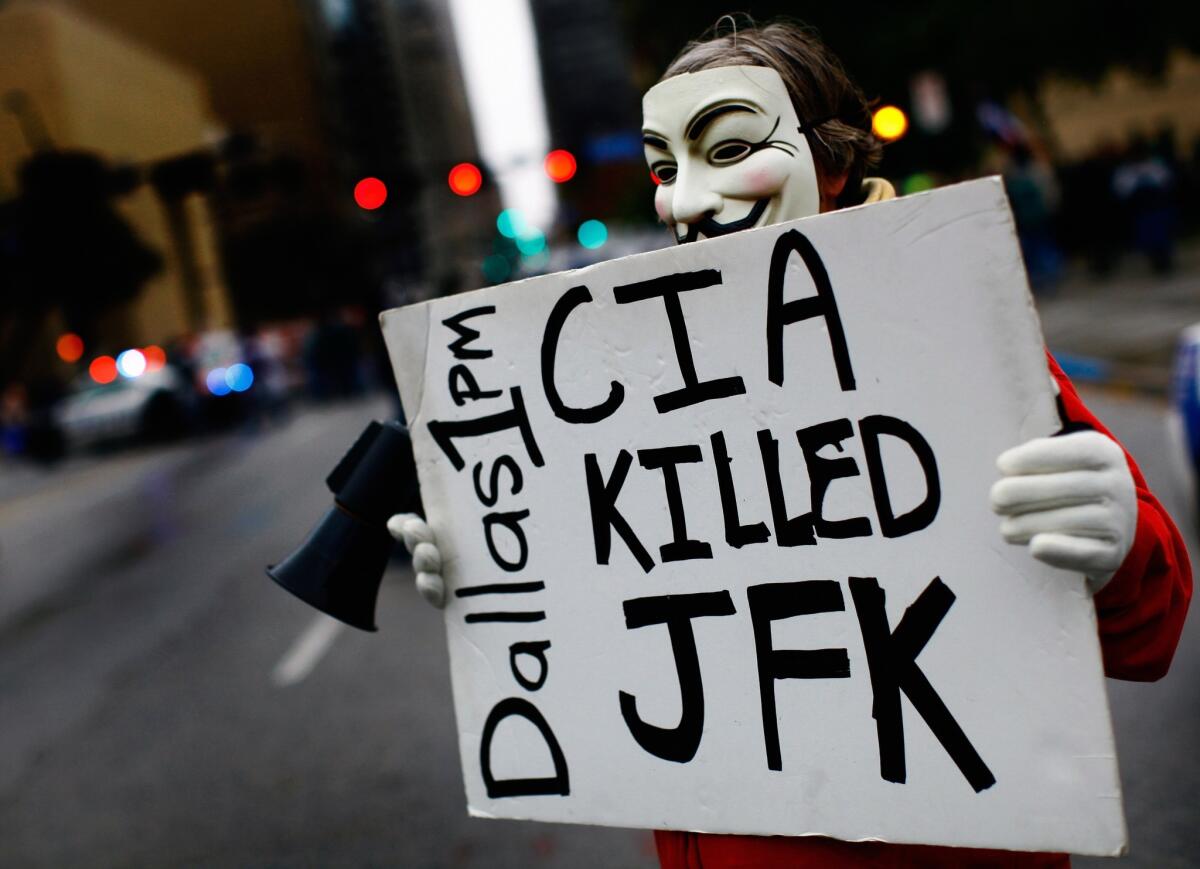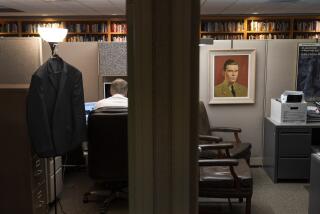Op-Ed: The logic behind conspiracy theories

A lone protester stands outside the John F. Kennedy Memorial Plaza in Dallas, Texas, on Nov. 22, 2013 – the 50th anniversary of the assassination of the 35th U.S. president.
The Internet is often accused of fueling conspiracy theories, but it also serves as an outlet for mindless conspiracy bashing.
Some pundits took the start of the new year as an excuse to aggregate, and denigrate, recent conspiracy theories. Alternet published “The 5 Craziest Right-Wing Conspiracy Theories of 2015” (subtitle: “The indefatigable right-wing loony factory pumped out some doozies this year.”). Bustle collected “The Most Bizarre Conspiracy Theories of 2015” and National Memo offered “This Year in Crazy: 2015 Belonged to the Wingnuts.” The Guardian’s film critic, Peter Bradshaw, wished for fewer “smug” conspiracy theories in 2016. “Nowadays,” he lamented, “there is always a malign pseudo-sophisticate dunce who can be relied upon to appear out of the online thicket, darkly insisting on a ‘provocateur’ conspiracy behind everything.”
Dismissing all conspiracy theories (and theorists) as crazy is just as intellectually lazy as credulously accepting every wild allegation.
When major news breaks, it doesn’t take long for people to come up with conspiracy theories, and it doesn’t take much longer for other people to call the conspiracy theorists wacky, delusional and other unkind adjectives. Confirmation bias kicks in; both sides double down on the inflammatory rhetoric.
Who’s “smugger,” really — to borrow Bradshaw’s word — the theorists or the anti-theorists? The antis should not be so quick to assert their superiority.
You don’t have to be crazy to believe conspiracy theories. In a 2013 survey of 1,247 registered American voters, for example, just over a third agreed that global warming is a hoax, and half agreed that there was a conspiracy behind the assassination of President John F. Kennedy. When researchers look at how many people believe any conspiracy theory, the figures come in even higher. As many as 9 out of 10 people acknowledge entertaining one conspiracy theory or another.
Recent psychological research reveals why we are all — yes, all — wired to feel the lure of conspiracy theories. Given a handful of dots, our pattern-seeking brains can’t resist trying to connect them.
Faced with events that have significant consequences, for example, we tend to suspect there must have been an equally significant cause. One experiment, conducted long before the disappearance of Malaysia Airlines Flight 370, used the context of a plane crash. If there were many casualties, people felt that big explanations, such as endemic malpractice in the airline industry, were more plausible. If there were no casualties, people were happy with smaller explanations, such as a single malfunctioning component.
It’s the impulse to think big — common to everyone — that leads some to believe that mass shootings are a ruse designed to repeal the 2nd Amendment, that an assassination couldn’t have been pulled off by a lone gunman, or perhaps that the president is a pawn of the New World Order.
But our built-in biases don’t just nudge us toward believing large-scale conspiracy theories; they also shape how we interpret our everyday lives. Consider some defining event in your life, such as how you met your spouse. You’re probably tempted to think there’s some deep explanation for it, such as fate or destiny.
Or imagine your child receives a routine vaccination, and he screams and cries for the rest of the day. Weeks later, he shows signs of autism. Given a coincidence like that, it’s not hard to see why a parent might suspect that the vaccine caused the disorder.
Our biases can lead us astray — plenty of scientific studies have failed to find any evidence that vaccines cause autism. But without them, we’d be lost, blind to cause and effect.
Sometimes the dots really are connected. If you eat a burrito for lunch and feel horribly sick later that night, you’ll probably blame the burrito — and you might be right.
If you had claimed, in the early 1970s, that a hotel burglary was, in fact, a plot by White House officials to illegally spy on political rivals and ensure President Nixon’s reelection, you might have been accused of conspiracy theorizing. Indeed, journalists Bob Woodward and Carl Bernstein were accused by the White House — and even their own editorial team at the Washington Post — of propagating conspiracy theories.
So if you’re one of those people who’s certain you’d never fall for a false conspiracy theory, consider the possibility that you’d never suss out a real one.
A recent study, for example, found that people who reject speculative conspiracy theories (such as “evidence of alien contact is being concealed from the public”) are also more likely to reject documented conspiracies (such as “How likely is the idea that the government has performed mind-control experiments on its own citizens without their consent?” — a coy reference to the CIA’s very real MKUltra program).
Dismissing all conspiracy theories (and theorists) as crazy is just as intellectually lazy as credulously accepting every wild allegation. The tricky part is figuring out what’s reasonable and what’s ridiculous, and we can do that only by honestly scrutinizing why we believe what we believe.
Seen from the perspective of psychology, conspiracy theorists aren’t so strange.
Or, looking at it another way, conspiracy theorists are weird; it’s just that the rest of us are weird too.
Rob Brotherton is an academic psychologist and the author of “Suspicious Minds: Why We Believe Conspiracy Theories.”
Follow the Opinion section on Twitter @latimesopinion and Facebook
More to Read
A cure for the common opinion
Get thought-provoking perspectives with our weekly newsletter.
You may occasionally receive promotional content from the Los Angeles Times.






